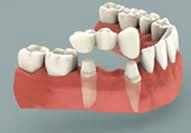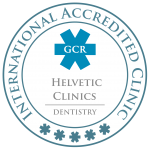Bridges
After an extraction, in case the patient doesn’t want or can’t have an implant, the missing tooth can be replaced with a bridge which is a fixed restorative treatment used to replace one or more missing teeth. A bridge might be necessary if you have lost one or more teeth.
The empty space that is left because of the missing tooth will cause the surrounding teeth to rotate or move towards the empty space resulting in a bad occlusion. The imbalance that a missing tooth may cause could lead to gum disease or temporomandibular joint disorders. Not only can missing teeth change your smile but they can also place greater strain especially on the teeth that are located either side of the space.

Three unit bridge2 teeth are sitting while one is hanging, filling the gap between the teeth
Bridges are commonly used to replace one or more missing teeth and they fill the space where the teeth are missing. They are cemented to the natural teeth or implants surrounding the empty space that serve as bridge anchors. A middle tooth, supported by the two surrounding artificial teeth, is added to this prosthetic device that is called, in the case of one missing tooth, a three unit bridge.
Just like the crowns, you have a choice of different materials for your bridge. Your dentist can help you decide which to use, based on the location of the missing tooth (or teeth), its function, aesthetic considerations and cost. A Bridge can be either made of Porcelain Fused to Metal, Zirconia or E-max. The difference between the three types is explained in the crowns section.
You Deserve the Best! For your Bridges Dental Treatment abroad, Helvetic Dental Clinics



















